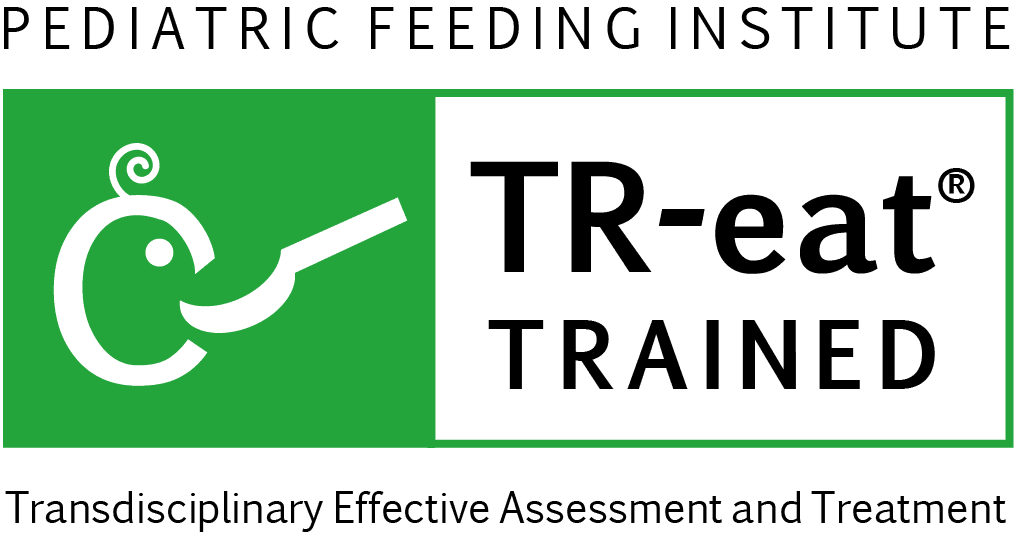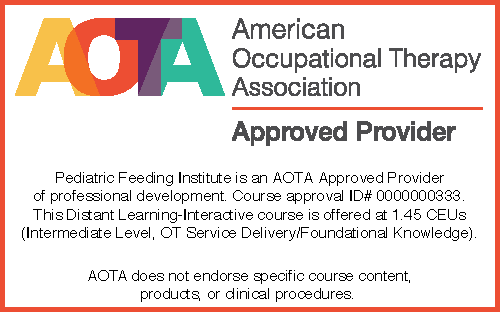Course Offerings
Online Courses
Live Courses
Mealtime Miseries: Management of Complex Feeding Disorders
How does feeding, a process so integral to the child’s health and well-being, go awry? The focus of the 2-day Mealtime Miseries course is on the Transdisciplinary Effective Assessment and Treatment (TR-eat®) model integrating oral motor therapy techniques and behavioral management for the treatment of complex feeding problems. The course covers innovative strategies, using video case examples, to address oral aversion, food refusal, poor transition onto solid foods, texture grading, learning to chew, self feeding and feeding difficulties related to autism and picky eaters. It is relevant for infants and children through school age. This course is packed with practical solutions and hands on techniques that will empower you with new treatment ideas for your most complex patients. These interventions are systematic and evidence based with research supporting outcomes. This course is appropriate for clinicians with all levels of experience. Live Courses offers more information about this course, list of locations and course registration. Contact us if you are interested in hosting this course at your location.
A 2 hour instructional training for parents and professionals is also available for scheduling upon request. This course covers an overview of pediatric feeding disorders and treatment options, including the basic principles of the TR-eat® model.

Upcoming Course Dates
Mealtime Miseries - Management of Complex Feeding Disorders
Course Dates
June 10 – 11, 2024 – LIVE ONLINE – Eastern Time Zone Start Time <Register Here>
August 9 – 10, 2024 – LIVE ONLINE – Central Time Zone Start Time <Register Here>
Please check back here or make sure to get added to our email list and you will be notified automatically when new courses are added.
Mealtime Miseries:
Course Description:
How does feeding, a process so integral to the child’s health and well-being, go awry? The focus of this 2 day course is on the Transdisciplinary Effective Assessment and Treatment (TR-eat®) model integrating oral motor/sensory therapy techniques along with medical and behavioral management for the treatment of complex feeding problems. It will cover innovative strategies, using video case examples, to address oral aversion, food refusal, poor transition onto solid foods, texture grading, learning to chew, self feeding and feeding difficulties related to autism and picky eaters. It is relevant for infants and children through school age. This course is packed with practical solutions and hands on techniques that will empower you with new treatment ideas for your most complex patients. These interventions are systematic and evidence based with research supporting outcomes.
This course is appropriate for the following clinicians working with children with feeding disorders: OT, COTA, SLP, RD, RN, CSW, BCBA, Psychologists. This course is appropriate for clinicians with all levels of experience.
Contact us if you would like more information about our live course opportunities. Additionally, please let us know if you would like to request assistance for special learning needs or other accommodations for attendance of this course.
Upon successful completion of the course, attendees will be granted permission to use the TR-eat® TRAINED Badge on any of their marketing materials, social media posts or practice website as it relates to their pediatric feeding credentials.
This is not a certification, but rather a recognition of completion of the course with an understanding of the TR-eat® Model and application of treatment interventions.


Learning Objectives:
Following this course, participants will be able to:
- Identify the foundational principles of the TR-eat® model.
- Identify at least 3 variables/issues (medical, oral motor, sensory or behavioral) that produce a complex pediatric feeding problem.
- Identify at least 3 therapeutic interventions to introduce oral feeding to the “new” feeder.
- Differentiate between behavioral strategies such as reinforcement, desensitization, shaping, chaining, and fading and how these can improve feeding skill development ranging from the “new” feeder to “selective” eaters.
- Identify at least 3 therapeutic interventions for texture grading, chewing and progression to age appropriate feeding skills for the “advanced” feeder.
- Demonstrate competence for spoon handling, squeeze bottle use and facilitative chewing strategies.
Schedule For Online Course:
Exact times vary depending on the course date. Please be sure to note the time zone for each course.
Day One
The TR-eat® Model & Introducing Oral Feeding
- 7:45 – Meeting entry available for on-line course
- 8:00-9:45 – Basic principles of the TR-eat® model, review of feeding development birth-24 months (video examples); what is PFD (Pediatric Feeding Disorder) vs ARFID (Avoidant Restrictive Food Intake Disorder); identification of common etiologies related to feeding problems and challenges
- 9:45-10:00 – Break
- 10:00-11:30 – Evaluation/treatment for the “new” feeder (medical management, initial assessment) with video case examples
- 11:30-12:15 – Lunch
- 12:15–1:30 – Continued evaluation/treatment for the “new” feeder (review of formulas, positioning, sensory and oral motor assessment, TOTs assessment, introducing spoon feeding) with video case examples
- 1:30-1:40 – Break
- 1:40-3:00 – Continued evaluation/treatment for the “new” feeder (introduction of spoon feeding, hands on practice for spoon handling/placement, use of the squeeze bottle, pureed table food) with demonstration and video case examples
- 3:00-3:05 – Break
- 3:05-4:30 – Introduction and application of behavioral principles, clinical problem solving with case examples
Day Two
Advancing Oral Feeding & Selective Eaters
- 7:45 – Meeting entry available for on-line course
- 8:00-9:45 – Continuation of application of behavioral principles, clinical problem solving, case examples. Feeding problems and interventions for the “advanced” feeder (texture grading – preparation of texture graded pureed/chopped table foods, teaching chewing skills) with case studies
- 9:45-10:00 – Break
- 10:00-11:30 – Continue interventions for the “advanced” feeder (teaching chewing skills, addressing food packing behavior, introduction of self-feeding) with case studies
- 11:30-12:15 – Lunch
- 12:15-1:30 – Continue interventions for the “advanced” feeder (self-feeding, cup drinking, straw drinking) with case studies
- 1:30-1:40 – Break
- 1:40-3:00 – Treatment techniques for children with autism, the “picky” eater and those diagnosed with ARFID (food fading, systematic desensitization, structured mealtimes, reward programs) with video case examples
- 3:00-3:05 – Break
- 3:05-4:30 – Continue treatment techniques for children with autism, the “picky” eater and those diagnosed with ARFID (food fading, systematic desensitization, structured mealtimes, reward programs) with video case examples.
Course Materials:
One week prior to the workshop, participants will receive a welcome email containing course information and links to download course handouts and reference materials.
When you register, we will request a shipping address in order to mail materials you will need to participate in the course. Your package should arrive at least one week prior to the course. The shipping cost is included in your registration fee for contiguous U.S. attendees only (not Alaska or Hawaii). PowerPoint handouts and course reference materials will be downloadable for all participants via links sent out prior to the course.
Thank you for considering registering for Mealtime Miseries. Shipping of materials used for the hands-on portions of the course are only available within the United States at this time due to unpredictable shipping delays and excessive costs. PowerPoint handouts and course reference materials will be downloadable for all participants via links sent out prior to the course.
Course Faculty:
Elizabeth Clawson is an internationally renowned pediatric clinical psychologist known for her extensive work in the field of pediatric feeding disorders. Dr. Clawson is a dynamic and engaging speaker who is able to combine her clinical expertise with research based outcomes to support the intervention strategies presented in this course. Dr. Clawson received her MS and PhD degrees from Virginia Commonwealth University. She completed her internship training at the Kennedy Krieger Institute/Johns Hopkins University School of Medicine Pediatric Feeding Disorders Program. She has an active clinical practice, as well as presented and published extensively in the area of pediatric psychology.
Elizabeth Clawson, MS, PhD, LCP, HSPP is employed by Peyton Manning Children’s Hospital at Ascension St. Vincent Medical Center, Evansville, IN, Pediatric Feeding Institute, Inc., and Thrive! Pediatric Feeding Therapy, LLC.
Disclosure:
Financial – Employee and Co-founder of the Pediatric Feeding Institute, Inc. Receives honoraria and royalty payments for speaking and products developed by Pediatric Feeding Institute, Inc. Employee/Owner of Thrive! Pediatric Feeding Therapy, LLC. Receives payment for treatment provided to clients who receive services through this company. Employee of Peyton Manning Children’s Hospital at Ascension St. Vincent Medical Center, Evansville, IN. Receives no compensation for speaking/presenting or for patients referred for services at this center.
Non-Financial – Has no relevant relationship with products or services described, reviewed, or compared in this presentation.
Carol Elliott is an internationally recognized and energetic speaker. Carol began her career in the area of pediatric Occupational Therapy in 1987 after receiving her degree at Elizabethtown College, Elizabethtown, PA. Since 1998 Carol has devoted her clinical practice to the treatment of children with complex feeding disorders. Her clinical practice provides treatment for infants through teenagers. Along with her full time clinical practice, she has published multiple articles, conducted numerous presentations and has provided consultative services to other professionals and treatment centers in the area of pediatric feeding evaluation/treatment.
Carol Elliott, BS, OTR/L is employed by the Pediatric Feeding Institute, Inc. and Pediatric Feeding Services, Inc.
Disclosure:
Financial – Employee and Co-founder of the Pediatric Feeding Institute, Inc. Receives honoraria and royalty payments for speaking and products developed by Pediatric Feeding Institute, Inc. Employee/Owner of Pediatric Feeding Services, Inc. Receives payment for treatment provided to clients who obtain services through this company.
Non-Financial – Has no relevant relationship with products or services described, reviewed, or compared in this presentation.
Disclosure Statements:
This presentation will focus exclusively on the TR-eat® model and will not include information on other similar or related methods.
PFI Squeeze bottles, along with similar feeding tools/products, will be discussed during the presentation. The squeeze bottle is offered for sale through the Pediatric Feeding Institute.
You may cancel your registration up to 7 days before the workshop start date to receive a refund less $35 administrative fee. No-shows or cancellations received less than 7 days prior to the course are non-refundable but can be rescheduled for a future course date. For courses hosted by individual facilities, there may be specific cancellation policies as noted on their registration materials or website.


Occupational Therapists will receive a certificate for 14.5 hours of continuing education credit (1.45 CEUs) for the completion of this two-day course. Participants must attend all course hours and complete demonstration component of the course in order to receive AOTA CEUs. This course does not provide partial participation for AOTA CEU credits.
This course is designed as intermediate level suitable for OTs and COTAs. The Illinois Early Intervention Training Program has approved this event for 14.5 hours of EI credential credit in the areas of 1.5 hours of Assessment, 1.0 hours of Atypical Development, 11.0 hours of Intervention, and 1.0 hours of Typical Development.
This course is approved for 14.5 BACB credit hours.
Attendees from other disciplines will also receive a certificate for 14.5 hours of continuing education credit for the completion of this two-day course.


Host A Course
Pediatric Feeding Institute can arrange for our 2-day course to be offered at your facility. These courses can be open to public registration or closed to attendees of your facility/center only. Contact us to find out more about hosting a course in your location.
